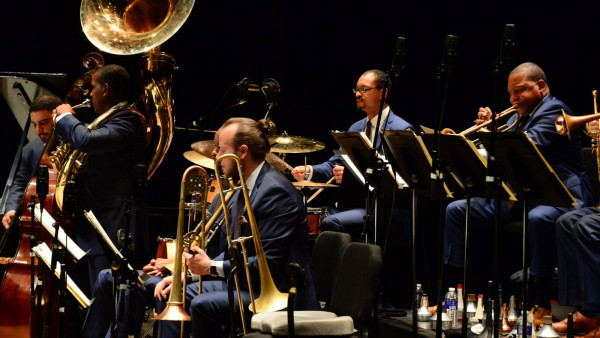Marsalis inspires at Kodak Hall
One of my favorite ways to hype up Rochester is by complimenting its live music scene. It’s fantastic on the small scale — the Bug Jar and other local venues host terrific local musicians and amazing student groups — but there’s no reminder quite like a concert at Kodak Hall that you, UR student, have incredible opportunities to see amazing music in the city we often forget is our home.
It’s easy to feel disconnected from Eastman as a River Campus student, but last Wednesday, going to see Wynton Marsalis and Jazz at Lincoln Center Orchestra with a ticket that would have cost a UR student who bought it early enough just $10 (an unbelievable steal), I was struck with the realization that Kodak Hall (and the entire music program at Eastman) is a big deal.
There was Marsalis, perhaps the greatest jazz trumpeter of our time, helming one of the most talented, celebrated ensembles in the genre, personally shouting out Eastman’s own Donald Hunsberger (conductor emeritus of its Wind Ensemble) and greeting the stage and the Rochesterians in the audience not as a visiting superstar but as an old friend.
Garth Fagan, the Tony-winning Rochester legend and choreographer for the fucking “Lion King,” was sitting two rows in front of me, and stood up at Marsalis’s invitation to the thunderous applause of the hall.
I haven’t even talked about the music itself yet. For the entire two-hour show (with a 15-minute intermission), it became clear that I was watching something truly special.
Performing Duke Ellington, Thelonius Monk, and plenty of other compositions and arrangements by the legends of jazz and blues history and some future legends in the orchestra, Marsalis and his band demonstrated a kind of freedom and communication that I’ve never encountered from big band jazz before.
For me, the best jazz happens when friends play together, and it was certain that Jazz at Lincoln Center Orchestra were friends in a way that makes the best jazz.
It’s from Marsalis himself, talking to us in the audience between songs, that I know not only what was being played but who was playing it. Carlos Henriquez provided steady, energetic bass as the music’s heartbeat, Victor Goines played sax, clarinet, arranged some extremely technically difficult music for the band to make sound effortless and free, and contributed his voice to “Yes Sir, That’s My Baby.” Dan Nimmer sounded pleasing on the piano, and Marsalis’s brother, Jason, lent his skills on the drums to percussion lines and solos, without which the show would have felt incomplete.
The only musician onstage who took a backseat, with no solos, was Wynton. I wasn’t complaining, given that the other 14 bandmates are arguably among today’s 15 finest big band jazz musicians, but Marsalis was the headliner, after all. After the encore — the lights went up, but the first ovation stayed seated — the band walked offstage, but the Marsalises, Henriquez, and Nimmer stuck around.
For the last few minutes of the show (with the lights up, and after some guests had for whatever confused reason left), it was just Wynton’s trumpet, accompanied by the piano, bass, and drums. It was natural, and human, and lots of other things that I would have much more difficulty conveying with writing than the gentlemen did with music.
When, to the second standing ovation of the evening, the quartet finally bid us goodnight, I could go to Java’s in peace, holding inside me the freshly minted memory of a tremendous show. Jazz is ephemeral, even as the music goes, and though I dearly hope to see Marsalis and Jazz at Lincoln Center Orchestra live again, nothing’s going to feel exactly the same as this set. And that’s okay — part of the beauty of something as free as jazz is that it’s always different — but I really want to urge you, reading this, to see as much live music as you can before it gets away from you. To be able to catch it for a little while, hold onto its shoulder and make eye contact, see it smile at you before it slips away into the cool night air, is something beautiful.
By Eddie Hock
Source: Campus Times

